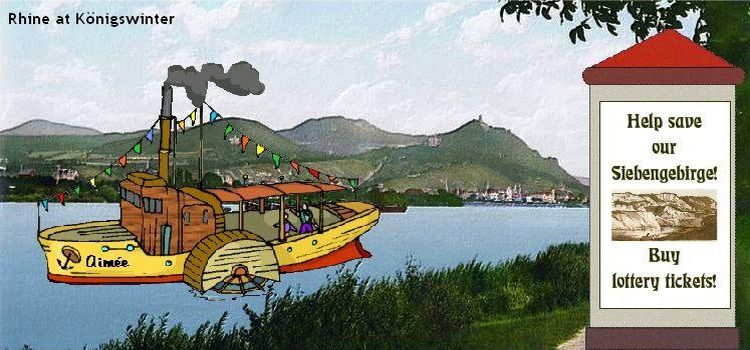
[Rhineland, 1893/94] A few weeks later, Lorenz and Annelie were on board of a huge ocean steamer from America to Germany, to visit Lorenz’ old homeland and their relatives and friends on the Rhine.
The joy of reunion was great. Emil, a gentleman around 50, seemed to be in the prime of his life, and time had not left any marks on Lena. Sophie and Andras had also come. They were now at the Austro-Hungarian Embassy in Brussels and highly respected. Sophie had renewed her contacts from her childhood days. Now Belgian millinery shops joined her training and exchange program for milliners and tailors from all over Austria-Hungary and Germany, to help young women build up a better life for themselves. Meanwhile, the “Csabany Program” was highly respected, Sophie’s name opened many doors for her protégés.
Quarries and railways
Tourism was now an important economic factor in the Siebengebirge. Lorenz, the white-haired older gentleman, was as excited as a little boy about the new mountain railroads and wanted to ride them al. The cog train Drachenfelsbahn, which had been going up to Mount Drachenfels since 1883, the very first rack railroad in Germany. Then the rack railroad to Mount Petersberg, running since 1888. Last but not least, there was the Heisterbach Valley Railway, which since 1891 ran from Niederdollendorf through Oberdollendorf past Heisterbach Abbey to Grengelsbitze. On weekends, it carried excursionists, during the week it took working people to work and stones from the quarries down into the valley.
The quarries … the sight of the “gaping wound” at Mount Petersberg gave Lorenz a stab in the heart. The damage to nature alarmed many people, and the VVS negotiated and fought. “Do they have a chance?” Lorenz asked. “Well, the interests of nature are opposed by the interests of the operators, but also of the quarry workers,” Emil replied. “And let’s not forget those of the indirectly affected, such as the Heisterbach Valley Railway, which mainly transports stones. Finally, many tourists come here and leave a lot of money in the hotels, restaurants, transportation companies, etc. We will do everything we can to find a good solution!” *
Rhine Steamer “Aimée”
Emil’s and Lena’s daughter Susan was a young lady. She had big news. Susan took them to the Rhine promenade, towards a little steamer with the name “Aimée” on it. Hans was already waiting for them, by his side stood a young man. “This is the ‘Aimée’,” Susan said with a beaming smile, “and this is her captain, Étienne.” The old Captain Boule-Piquelot had died and left the “Aimée” to his foster son Étienne and his friends, Hans and the Bergmanns. “We will cruise the Rhine under German and Alsatian flag and keep the ‘Aimée’s’ tradition alive”, Susan went on. “Hans will be at the helm, and I’m in charge of the gastronomic service.”
Annelie smiled and winked at her husband Lorenz. “Susan is glowing,” she whispered, “and I bet it’s not only about this gorgeous little steamer. “Étienne is a fine young man”, Hans said, having noticed their whispered conversation. “I’d love them to get together, preferably on the “Aimée”. He had immediately liked the young captain, and he was very happy that he didn’t have to become a retired captain just sitting on a couch.
Militarism
That evening they all sat together. “May your happiness last forever,” Lorenz said, raising his glass, and sent a silent prayer after it, “And may you never be forced to take up arms.”
Later on Emil approached him. “You sense it too, don’t you,” he began, “this growing militarism and nationalism. Many around here aren’t satisfied with Germany’s place in the world. For them, it is time for our country’s military and economic strength to pay off, for the world to recognize Germany as a great power that will always be at the top. Bismarck’s days are over, and so is his prudent foreign policy. Kaiser Wilhelm II is the perfect monarch for these people. They celebrate the anniversary of the battle of Sedan in grand style, thinking that war means glory above all. Unlike you and me, many of them have never experienced the horrors of war.”
* After long discussions, land purchases and law suits, the VVS could close the last quarry on Mount Petersberg in 1908. However, the quarries at the mountains Weilberg and Stenzelberg went on.

Be the first to comment